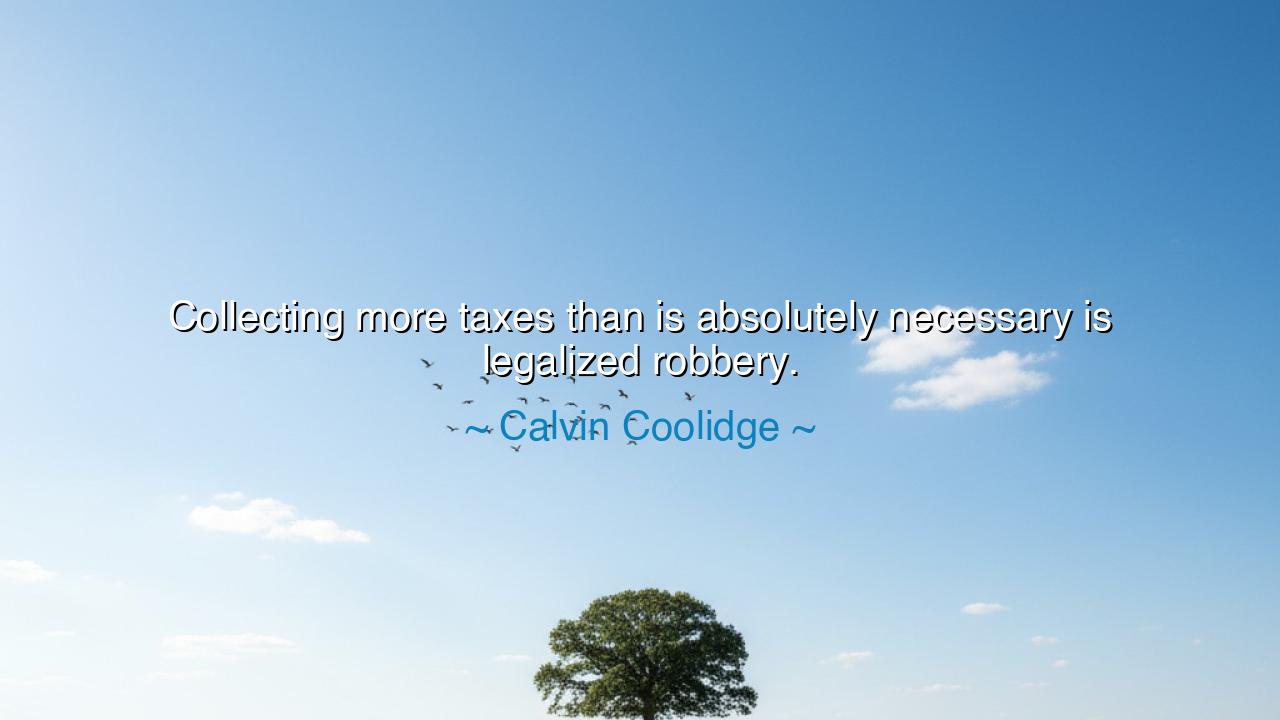
Collecting more taxes than is absolutely necessary is legalized






Calvin Coolidge, the quiet yet sharp-voiced president of the early twentieth century, once proclaimed: “Collecting more taxes than is absolutely necessary is legalized robbery.” In this bold statement, he revealed a truth as ancient as the rise of kings and empires: that the state, though born to protect and preserve, can become the very thief it was created to restrain. His words fall with the weight of both warning and wisdom, reminding all peoples that liberty is fragile, and that when rulers overreach, the wealth of the people becomes plunder hidden behind legality.
The meaning of this saying is direct and profound. Taxes, when used justly, are the lifeblood of a nation: they build roads, guard borders, and uphold the institutions of law. Yet when taxation exceeds necessity, when it burdens beyond fairness, it transforms into robbery, stripped of masks. Coolidge’s phrase “legalized robbery” is no exaggeration; it is the recognition that unjust power does not always arrive with swords—it can come clothed in statutes and decrees, its theft sanctified by parchment and seal. He warns that the people’s wealth belongs first to them, and only in measure to the state.
The origin of this declaration lies in Coolidge’s era and his own philosophy of limited government. Known as “Silent Cal,” he believed deeply in restraint, frugality, and the safeguarding of liberty against the creeping grasp of government excess. In the wake of World War I, when the machinery of taxation had expanded enormously, he became a champion of reduction, insisting that the prosperity of the people must not be siphoned away to feed bloated systems of power. Thus his words are not merely political rhetoric, but the creed of a man who saw taxation as a sacred trust, not a tool of exploitation.
History provides ample testimony to Coolidge’s warning. Consider the burden of taxation in pre-revolutionary France, where the nobility and clergy lived exempt while the common people bore crushing levies. Bread grew scarce, debt suffocated the nation, and yet the king’s court demanded ever more. The result was the French Revolution—a tempest born from injustice, when taxation crossed the line into robbery, and the people, weary of carrying the weight of privilege, rose to cast off their chains. Here Coolidge’s words find their proof: that excessive taxation does not preserve order but destroys it.
There is an emotional current in Coolidge’s phrasing. He does not call excessive taxation a mistake, an error, or a miscalculation—he calls it robbery. This word burns with moral judgment, painting the overreaching state not as misguided but as criminal. It reminds us that oppression is not softened by legality; injustice remains injustice, even if wrapped in the robes of authority. His words strike the conscience, urging the people never to forget that government exists for their sake, not they for the government’s.
To future generations, this saying is both warning and counsel. The warning is that liberty can be lost not only to invading armies or despotic kings, but also to the slow suffocation of unjust burdens. The counsel is to demand vigilance, transparency, and restraint in the management of public wealth. Citizens must remember that their voice, their vote, and their vigilance are the guardians that prevent the slide from fair taxation into legalized plunder.
The lesson is clear: cherish the balance between what is needed for the common good and what is taken in excess. In daily life, this means not only questioning government policies but also cultivating integrity in your own dealings—never taking more than is just, whether in commerce, labor, or leadership. Practically, it means supporting leaders who prize responsibility over extravagance, and recognizing that a nation prospers most when its people are free to prosper without undue burden.
Thus Calvin Coolidge’s words endure as a flame in the darkness: “Collecting more taxes than is absolutely necessary is legalized robbery.” Let the rulers hear, and let the people remember: taxation must serve justice, not oppression. And let all who walk in freedom guard against the slow theft of their liberty, for once the robber wears a crown of law, he is more dangerous than any thief in the night.






AAdministratorAdministrator
Welcome, honored guests. Please leave a comment, we will respond soon